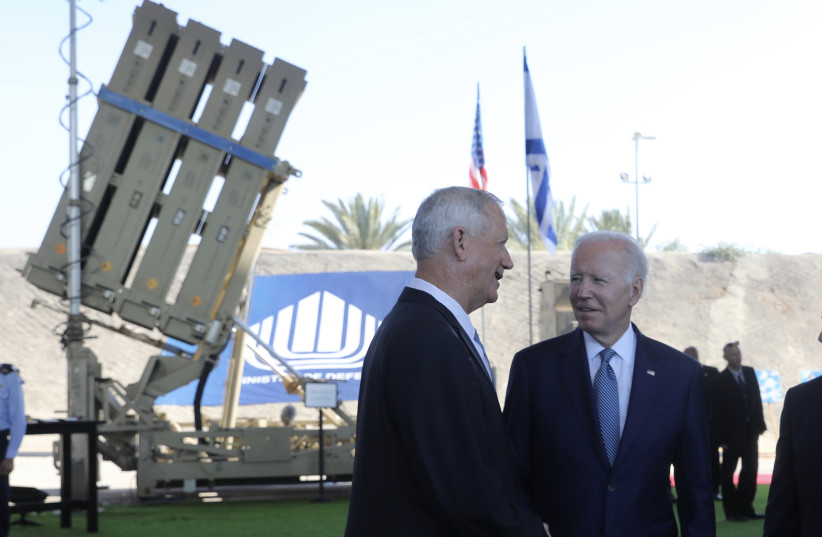Prime Minister Yair Lapid has requested a meeting with US President Joe Biden during his visit to the US for the UN General Assembly next month, amid deep concern in Jerusalem over an impending nuclear deal between Washington and Tehran.
Lapid hopes to meet with Biden on September 20, the day that the US president is set to address the General Assembly, Channel 11 reported. The meeting would be a day or two before Lapid’s speech is likely to take place.
Meanwhile, Lapid has yet to be able to speak to Biden on the phone, despite recent advances in Iran talks, according to multiple sources. At first, the White House cited Biden’s summer vacation, but the president returned to Washington on Wednesday.
The Prime Minister’s Office declined to comment on a possible Biden-Lapid call or meeting.
Defense preparations
Defense Minister Benny Gantz called to upgrade military capabilities to face Iran, regardless of whether a nuclear deal is signed, in a meeting with US National Security Advisor Jake Sullivan over the weekend.

Gantz “emphasized the importance of maintaining and advancing operation capabilities for both defensive and offensive purposes in [the] face of Iran’s nuclear program as well as its regional aggression,” the Defense Ministry stated.
“This is regardless of the discussion surrounding the agreement,” the ministry added.
Biden has said that the US would attack Iran as “a last resort,” which some in Jerusalem have viewed as stopping short of a credible military threat that would deter the Islamic Republic from developing a nuclear weapon.
Gantz’s meeting with Sullivan came days after Washington submitted its response to Iran’s demands following a draft of the nuclear deal that was meant to be final, according to the talks’ coordinator, the EU.
Lapid said that the US “accepted a large part of what we wanted them to put into the draft,” likely referring to Washington declining to provide additional guarantees to Iran about future sanctions and about closing International Atomic Energy Agency investigations into undeclared nuclear sites.
However, Mossad chief David Barnea expressed concern in briefings to Lapid and other officials that the US is “rushing into an accord that is based on lies” and that the deal suits American and Iranian interests but is “very bad for Israel.”
Gantz briefed think tank directors in Washington on Friday, warning that the 2015 Iran nuclear deal that world powers have sought to revive would need a serious overhaul in order to prevent Tehran from attaining a nuclear weapon.
“Iran has gained knowledge, infrastructure and capabilities – much of which is irreversible,” he said. “This will enable Iran to further expand its nuclear program during the period of an agreement that would have fewer restrictions. Iran would be able to acquire a nuclear weapon when said agreement would end in 2031.”
"Iran has gained knowledge, infrastructure and capabilities – much of which is irreversible."
Defense Minister Benny Gantz
Why is Iran's nuclear situation a concern?
In recent years, Iran produced thousands of advanced centrifuges, and if, as the latest version of the deal stipulates, they would be stored and not destroyed, they will be readily available for enrichment once the agreement comes to an end – or if Tehran chooses to withdraw from it.
Gantz also pointed to the new advanced cascade at the Fordow site, where Iran is capable of enriching to 90% immediately, should it choose to do so.
The defense minister also emphasized that Iran has obstructed IAEA investigations.
“The common goal of Israel and the US is to prevent Iran from acquiring a nuclear weapon, and the way to do so is to roll [the nuclear program of] Iran back and to deter it,” he said. “Israel will continue to take action to ensure its security regardless of any developments and to prevent Iran from achieving regional hegemony.”
French President Emmanuel Macron said on Friday that the Iran deal, “if it’s concluded in the terms presented today, is useful and is better than no agreement.”
Still, Macron admitted that the deal does not address Tehran’s “ballistic missile program, regional influence and multiple [acts of] destabilization.”
“We have been very careful to ensure that the balance of a serious accord has been met,” Macron told reporters during a visit to Algeria. “The ball is now in Iran’s court.”
"We have been very careful to ensure the balance of a serious accord has been met."
French President Emmanuel Macron
He said Paris would back the IAEA to ensure outstanding issues were not impacted by political pressure.
Reuters contributed to this report.
